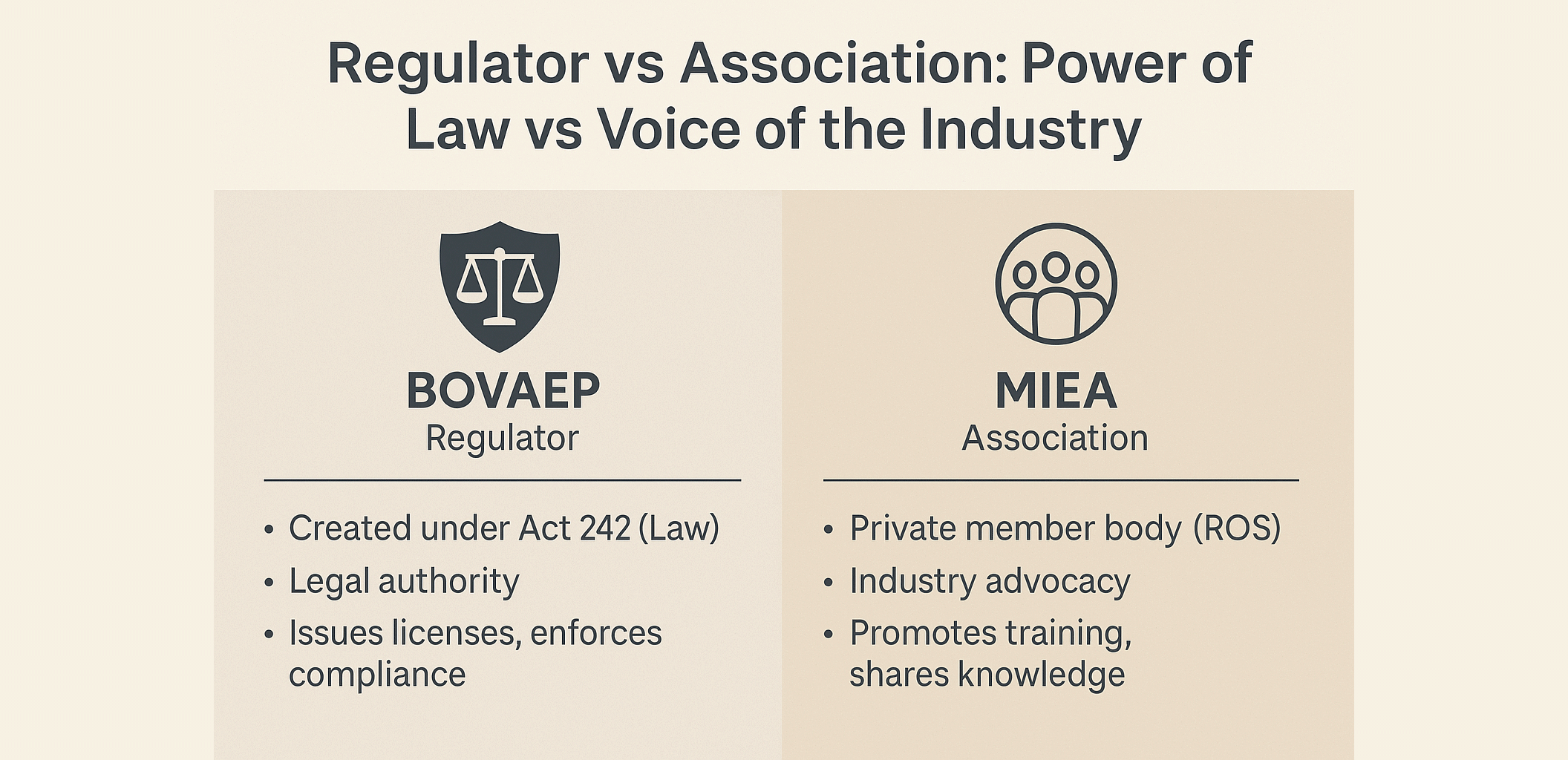Regulator vs Association: Why Many Agency Bosses Still Confuse the Two

In Malaysia’s real estate industry, many agency leaders still blur the line between regulation and representation.
They assume that joining an association means compliance — or that the association can act like a governing body.
In reality, the two serve very different functions.
Understanding this distinction is not just academic — it defines who you actually answer to, and who truly protects your license.
1. The Regulator: Power by Law
The regulator is a statutory authority — a government-backed body created through legislation.
In Malaysia, that’s the Board of Valuers, Appraisers, Estate Agents and Property Managers (BOVAEP), established under the Valuers, Appraisers, Estate Agents and Property Managers Act 1981 (Act 242).
BOVAEP’s role is not to represent agents — it is to regulate them.
Key Functions:
- Issue and renew licenses for Registered Estate Agents (REA) and Real Estate Negotiators (REN).
- Enforce the law through disciplinary powers — suspension, revocation, or prosecution.
- Set entry requirements, exams, and CPD standards.
- Ensure lawful client account management and advertising conduct.
- Protect the public interest, not private business interest.
In short, the regulator has legal teeth — it can penalise, suspend, or ban practitioners who violate the Act or its Rules.
When you hold a REN tag or REA license, you are legally accountable to BOVAEP — not to any association.
2. The Association: Power by Members
An association, by contrast, is a private membership organisation registered under the Registrar of Societies (ROS) — not under Act 242.
Examples include:
- MIEA (Malaysian Institute of Estate Agents)
- PEPS (Association of Valuers and Property Consultants)
- FIABCI Malaysia, REHDA, and others across the wider property industry.
Associations exist to represent, not regulate.
They are the voice of the industry, not the law of it.
Key Functions:
- Promote professionalism, training, and ethics among members.
- Organise networking events and industry recognition.
- Provide CPD courses and knowledge sharing.
- Advocate policy improvements to government and regulators.
- Protect members’ business interests and reputation.
Associations cannot fine, suspend, or revoke licenses — because they don’t grant them in the first place.
3. The Core Difference
| Aspect | Regulator (BOVAEP) | Association (e.g., MIEA) |
|---|---|---|
| Legal Foundation | Created under Act 242 (Law) | Registered under ROS |
| Primary Duty | Protect the public interest | Represent members’ interest |
| Authority | Can investigate, suspend, revoke, or fine | Can only advise, recommend, or mediate |
| License Power | ✅ Yes — issues REN & REA licenses | ❌ No — membership is voluntary |
| Accountability | Mandatory compliance | Optional participation |
| Focus | Discipline, governance, compliance | Advocacy, training, networking |
Summary:
The Regulator is the Referee — it enforces rules.
The Association is the Coach — it helps members play better.
4. Why Agencies Must Know the Difference
Confusing the two can be costly.
Some agency bosses proudly claim association membership as “proof of compliance,” but that doesn’t protect them from BOVAEP enforcement.
If your agency mishandles client accounts, runs illegal ads, or fails to renew REN tags — no association can save you.
Only compliance with Act 242 and Circular 5/2018 can.
On the other hand, ignoring associations entirely also means missing out on the collective benefits — training, policy influence, and professional community.
A smart agency respects both:
The Regulator for its authority.
The Association for its advocacy.
5. The Ideal Relationship
A healthy real estate ecosystem needs both sides working together:
The Regulator ensures the industry stays lawful, accountable, and trustworthy.
The Association ensures practitioners stay informed, united, and progressive.
When both function well, agents benefit from clarity, credibility, and career growth.
Regulation without representation leads to fear.
Representation without regulation leads to chaos.
The balance between both is what makes a profession truly sustainable.
6. The Bottom Line
For Malaysian property agencies, it’s simple:
You are licensed by BOVAEP, not MIEA.
You are guided by associations, not governed by them.
One protects the public trust, the other protects the industry voice.
Understanding this difference isn’t just good knowledge — it’s professional survival.
Because compliance keeps your license.
But collaboration keeps your future.











































































































